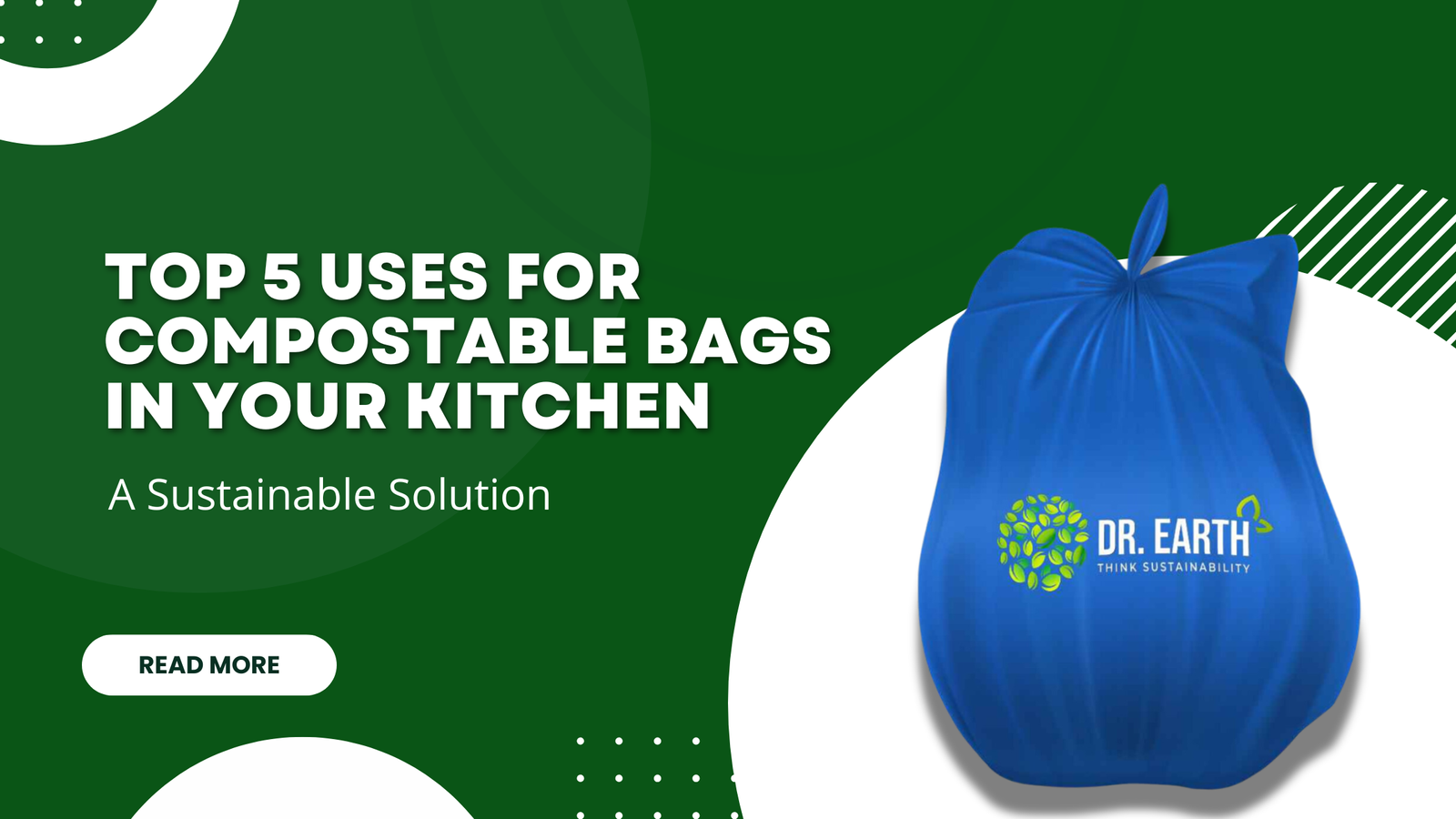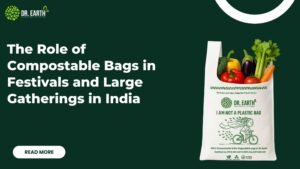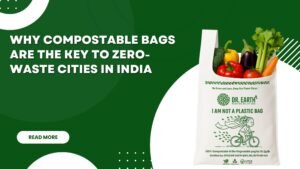
Compostable products fill into the slots of eco-friendly solutions as the world embraces and adopts sustainable living. Among these are compostable bags, which are among the most sought options after the traditional plastic bags, mainly in kitchens that manage a reasonable amount of waste for sustainability. With leading contender status in terms of biodegradable and compostable bags, the world of Dr. Earth is ahead of its time by offering certified and environment-friendly products toward a future free of plastic.
The top 5 uses for compostable bags in your kitchen and how this will lead to less waste, support sustainability, and make the daily routine greener and more environmentally friendly.
1. Storing Food Scraps for Composting
The most common and valuable application of compost bags in the home is use in food waste collection. Indeed, compostable bags make great vessels for wrapping fruit peels, vegetable scraps, coffee grounds, eggshells, and other organic wastes that can be add to a heap of compost. Unlike plastic bags, which may take as long as centuries to break down, thus adding to pollution, compostable bags break down naturally and leave no harmful residues behind.
Benefits:
- Eco-Friendly: Compost bags are made of plant matter. Therefore, they will easily biodegrade into organics in the composting environment and not pollute like plastic.
- Easy to use: Collect your kitchen rubbish, fill up the bag, tie it up and then put it in your compost bin. Simple, hassle-free, and safe for anyone dealing with food waste.
- Helps in Sustainable Life: Food waste diverted from landfills reduces methane emissions and is therefore a healthier planet.
If you need a method to make food waste disposal easier or greener, easy compostable bags from Dr. Earth give you a very simple solution.
2. Packing Leftovers and Storing prepared Ingredients
Many people use compostable bags to pack leftovers or keep prepared ingredients within their kitchen. Keeping chopped vegetables, marinating meats, or storing leftover rice and pasta require some much-needed flexibility beyond traditional plastic zip-lock bags or cling films. Dr. Earth’s compostable bags are designed to tackle moisture well and keep the freshness of the food store, making them a god option for kitchen storage.
Benefits:
- No Toxic Chemicals: They contain no toxic chemicals, unlike plastic bags that sometimes release chemicals to your food; compostable bags are create without such destructive agents as BPA, PVC, or phthalates.
- Maintains Freshness: They prevent the deterioration of food for you but do not harm the environment. Many compostable bags are design using materials that offer airtight seals and moisture resistance that ensure your food will not be damage.
- Supports Zero Waste Lifestyle: This helps in reducing carbon footprint because you are picking compostable bags and working your way to a zero-waste kitchen.
Food storage compostable bags do more than reduce plastic waste; they contribute to and help perpetuate sustainable practices for both you and the environment.
3. Wrapping Up Sandwiches and Snacks for On-the-Go
Compostable bags also come very handy for packing sandwiches, fruits, or any snack when you are out going for the busy day. From packing lunch for work or to school to going for a picnic, the compostable bags can serve as a nice eco-friendly alternative to traditional usage of single-use plastic sandwich bags.
Benefits:
- Eco-Friendly Packaging: Switch to compostable bags for packaging lunch or snacks; the environmental impact of plastic single-use bags is massive .
- Convenience: This is just as convenient as plastic, but much more friendly to the earth. There’s no qualm about throwing them in your lunch box or bag, knowing you’re making a conscious decision for the environment.
- Easily Decomposes: Compostable bags decompose completely after use with no waste produced.
Want a bit of ease in packing lunch and snacks? Buy the compostable bags.
4. Storing Trash or Garbage for Collection
Compostable bags are the most practically use in the kitchen for collecting trash or garbage. Most probably, people see bags as a result of collecting or throwing away waste; using compostable bags can easily dispose of both the food scrap and general kitchen waste. This has made it far better than the conventional plastic bags meant for trash, which often add to landfills or flood the oceans by piling up plastic waste.
Benefits:
- Better Waste Disposal: The collection of waste through biodegradable bags ensures that organic waste material is differentiate from the non-biodegradable waste material, thus composting food wastes and properly getting rid of the rest.
- No Harm to Environment: Unlike plastic bags, which stay for hundreds of years in the environment, biodegradable bags degrade naturally and help reduce piling wastes in a landfill.
- Reduced plastic pollution: compost bags fight the plastic pollution war and help contribute to making our planet a cleaner place.
Compostable bags from Dr. Earth help cut down on how much plastic you’re using in waste management. They are an integral component of any eco-friendly kitchen setup.
5. DIY Kitchen Projects or Crafts
If you’re a DIY type of person or you enjoy doing crafts in the kitchen, then compostable bags can be used highly creatively, such as making homemade herbal sachets or potpourri bags or even as liners for making bread or pastry at home. They are great additions to your kitchen toolbox because they are natural and biodegradable and can be use in many different types of kitchen craft activities.
Benefits:
- Non-toxic and safe: They are made of plant-derived material, hence not toxic and safe for use in a wide range of crafting and kitchen works.
- Multipurpose usage: You can apply compostable bags for any kind of kitchen craft related to preserving herbs or making home reusable produce bags.
- Eco-conscious crafting: The use of compostable bags in your DIY projects promotes sustainable processes.
Composting bags are convenient and they also reduce the waste produced by these nifty crafts made in your kitchen.
Why Choose Compostable Bags from Dr. Earth?
Compostable bags by Dr. Earth are made with the intent to contribute toward sustainability and ecological living. Made from natural, plant-based materials, these compostable bags can even replace plastic bags that take hundreds of years to break down. Here is why you should switch to compostable bags in the kitchen by Dr. Earth:
- Certified by Leading Authorities: The products of Dr. Earth are certified by leading authorities to make sure that the quality is good and also that the biodegradability does not harm the environment.
- Durable and Strong: These are very earth-friendly and also very strong and very capable of doing much within a kitchen, from disposing of waste to even food storage.
- Composting and Biodegrading: The bags of Dr. Earth break down all the way in composting conditions and bring in healthier soils and reduce waste in the landfills.
Final Thoughts
Compostable bags are an easy and effective way of reducing your environmental footprint in the kitchen, where waste management is so important. From collecting food scraps that you will compost to packaging snacks or wrapping sandwiches, these handy bags serve many purposes to reduce the amount of plastic used. You are going to make your kitchen sustainable and help create a cleaner, greener earth with Dr. Earth’s compostable bags.
Including these top 5 uses for compostable bags in your kitchen will take one simple, impactful step towards reducing your dependence on plastic and embracing eco-friendly practices that benefit your family and the environment.
Try Dr. Earth’s compostable bags today and make your kitchen more sustainable tomorrow!
FAQs
Q- 1. What makes compostable bags different from regular plastic bags?
Ans- Compostable bags have cellulose derived from plant-based ingredients like starch from corn or potatoes. Since such bags are composted due to the natural forces of composting, plastic bags, however, take centuries to decompose, and their poor waste management results in their presence within the environment. In contrast, there will be no toxic residue when compostable bags decompose into organic material, so they become a more sustainable option for waste disposal as well as for the storage of food.
Q- 2. Can compostable bags hold wet food scraps and liquids?
Ans- Of course, compostable bags are design to resist wet food scraps and moisture. Most compostable bags like Dr. Earth, for instance, are moisture-resistant, meaning they can withstand food scraps, fruit peels, vegetable waste, coffee grounds, and even liquid. Still, it is a good idea not to overload bags with very liquid-heavy waste, as this may compromise the strength of the bag.
Q- 3. Can compostable bags be use for both food storage and trash?
Ans- Yes! Compostable bags are one of those products that you can use for multiple purposes. They’re great for collecting food scraps that you will compost into or using to store leftovers or prepped ingredients. But they also work pretty well for general kitchen waste in trash bags if you really want to keep your waste stream very green.
Q- 4. Do compostable bags decompose in landfills?
Ans- Compostable bags are made to decompose in composting conditions, under which they are expose to heat, moisture, and microbes that facilitate decomposition. Under landfills, on the other hand, the bags will not decompose properly since the conditions (oxygen, water, and microbes) are lacking. To achieve a good environmental effect, it is important to put them in a compost bin rather than a landfill.
Q- 5. How long do compostable bags take to break down?
Ans- The amount of time it takes for the compostable bags to decompose depends on the environment to which they are left. For example, commercial composting facility conditions: under these ideal composting conditions, compostable bags would normally take 3 to 6 months. In a home compost pile, this would take a little longer, but compostable bags would break down far more quickly and safely compared with plastic, which may take hundreds of years to decompose.
Share:
Related Posts














